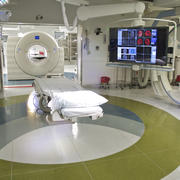Quinn joined the Surgical Planning Laboratory in the summer of 2023 and worked on multiple…

The National Center for Image Guided Therapy at Brigham and Women’s Hospital Receives Renewed Funding from NIH
The National Institutes of Health (NIH) has renewed funding for the National Center for Image Guided Therapy (NCIGT) at Brigham and Women’s Hospital (BWH). The five-year, $12 million grant will allow the center to continue its work focused on the multidisciplinary development of innovative image-guided intervention technologies to enable effective, less invasive clinical treatments that improve both results and value for patients.
Under the leadership of Clare Tempany, MD, the NCIGT is helping to implement this vision with support from the National Institute of Biomedical Imaging and Bioengineering (NIBIB), by serving as a proving ground for some of the next generation of image-guided therapies.
Since its inception in 2005, NCIGT has provided local, regional, national and international researchers with access to these capabilities. Recent groundbreaking scientific achievements of NCIGT include the use of focused ultrasound energy to disrupt the blood brain barrier and deliver targeted drugs to the central nervous system, and the use of intraoperative mass spectrometry to guide brain tumor surgery. These and other innovations have resulted in more than 400 peer-reviewed publications, some of which have been translated into the treatment of more than 900 patients in the Advanced Multimodality Image-Guided Operating (AMIGO) suite at BWH.
“Having performed hundreds of cases in AMIGO, the NCIGT team has a deep understanding of the current limitations of image-guided cancer treatments,” said Tempany, director of the NCIGT. “This renewed funding will allow us to develop novel innovative technologies for ideal precision cancer surgery.”
In addition to technology development, NCIGT will conduct trials to validate and translate the technologies, primarily involving prostate and brain cancer patients. These cases span a broad range of diseases and technological applications, from cancer diagnosis and characterization to its subsequent complete removal. Specifically, researchers at the NCIGT will develop, test and investigate novel techniques to define the tumor with precision to ensure precise biopsy sampling and complete treatment.
In addition to Tempany, who is the principal investigator (PI) of the Prostate Core, the NCIGT leadership team consists of Tina Kapur, PhD, executive director and Outreach PI; Ron Kikinis, MD, Collaborations director; Alexandra Golby, MD, Neurosurgery Core PI; William Wells, PhD, Computation Core PI; and Noby Hata, PhD, Guidance Core PI.